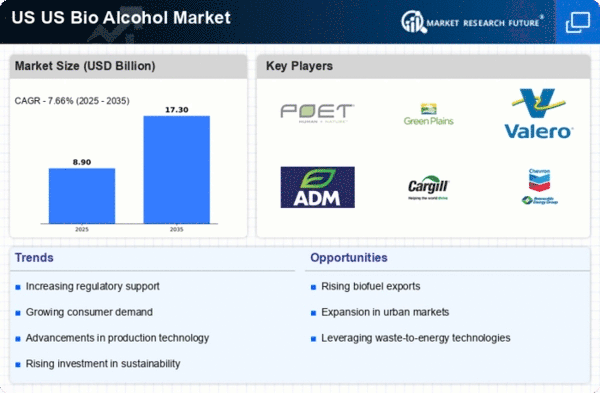Advancements in Production Technologies
Technological advancements in the production of bio alcohols are playing a crucial role in the US Bio Alcohol Market. Innovations such as improved fermentation processes and the use of genetically modified organisms are enhancing the efficiency and yield of bio alcohol production. For instance, recent developments have led to the production of cellulosic ethanol, which utilizes non-food biomass, thereby reducing competition with food crops. In 2025, the US saw a 25% increase in bio alcohol production efficiency due to these technological improvements. Additionally, the integration of bioreactors and advanced enzymatic processes is streamlining production, making it more cost-effective. These advancements not only lower production costs but also improve the overall sustainability of bio alcohols, making them more competitive against conventional fuels. As technology continues to evolve, it is likely to further propel the growth of the US Bio Alcohol Market.
Government Policies Supporting Biofuels
The US Bio Alcohol Market is significantly influenced by government policies aimed at promoting renewable energy sources. The Renewable Fuel Standard (RFS) mandates the blending of biofuels into the fuel supply, which has led to an increase in bio alcohol production. In 2025, the US produced approximately 16 billion gallons of biofuels, with a substantial portion being bio alcohols. These policies not only provide financial incentives for producers but also create a stable market environment, encouraging investment in bio alcohol technologies. Furthermore, state-level initiatives, such as California's Low Carbon Fuel Standard, further bolster the market by setting ambitious targets for reducing greenhouse gas emissions. This regulatory framework appears to be a driving force behind the growth of the US Bio Alcohol Market, fostering innovation and expanding production capabilities.
Consumer Preference for Eco-Friendly Products
There is a growing consumer preference for eco-friendly products, which is shaping the US Bio Alcohol Market. As awareness of climate change and environmental issues increases, consumers are actively seeking sustainable alternatives to traditional fossil fuels. Bio alcohols, derived from renewable resources, are perceived as a cleaner option, leading to a rise in demand. In 2025, surveys indicated that over 60% of consumers expressed a willingness to pay a premium for biofuels, including bio alcohols, that contribute to lower carbon emissions. This shift in consumer behavior is prompting manufacturers to invest in bio alcohol production, thereby expanding the market. Retailers are also responding by offering more bio-based products, further enhancing the visibility and accessibility of bio alcohols. This trend suggests that consumer preferences are likely to continue driving the growth of the US Bio Alcohol Market in the coming years.
Rising Oil Prices and Energy Security Concerns
The volatility of oil prices and growing concerns over energy security are driving interest in the US Bio Alcohol Market. As oil prices fluctuate, consumers and businesses are increasingly looking for alternative energy sources to mitigate the impact of rising fuel costs. In 2025, the average price of gasoline reached $4.00 per gallon, prompting a shift towards biofuels, including bio alcohols, as a more stable and potentially cheaper option. Furthermore, the US government's focus on energy independence has led to increased investments in domestic biofuel production. This trend indicates that bio alcohols could play a pivotal role in reducing reliance on imported oil, thereby enhancing national energy security. As these economic factors continue to influence the market, the US Bio Alcohol Market is likely to experience sustained growth.
Collaboration Between Industry and Research Institutions
Collaboration between the bio alcohol industry and research institutions is fostering innovation and growth within the US Bio Alcohol Market. Partnerships between universities, government agencies, and private companies are facilitating research and development efforts aimed at improving bio alcohol production processes and exploring new feedstock sources. In 2025, several initiatives were launched to enhance the efficiency of bio alcohol production, including projects focused on waste-to-energy technologies. These collaborations not only accelerate technological advancements but also provide access to funding and resources that may not be available to individual companies. As research continues to yield promising results, it is likely that the US Bio Alcohol Market will benefit from enhanced production capabilities and a broader range of bio alcohol products.

















